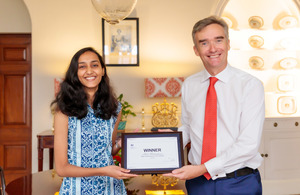Government’s Covid-19 charity support fund delivers hope to 6.5 million people across country
- New Minister for Civil Society Nigel Huddleston praises results of ‘truly outstanding’ impact report, which highlights that 6.5 million people have been helped by Government’s £200 million Coronavirus Community Support Fund (CCSF)
- Data shows CCSF helped local organisations survive and communities to thrive amid Covid-19 challenges
The new Minister for Civil Society Nigel Huddleston has hailed small charities as ‘the backbone of our communities’, as an impact report published today reveals that 8,200 organisations have supported an estimated 6.5 million people during the COVID-19 pandemic, thanks to £200 million in bespoke Government funding, distributed by The National Lottery Community Fund (NLCF).
The report, published by the Department for Digital, Culture, Media and Sport (DCMS) and The (NLCF), highlights how the Coronavirus Community Support Fund has benefited communities in every region of the country, from Cornwall and Hertfordshire to County Durham and Merseyside. It has helped charities and social enterprises to carry out critical work and continue protecting the most vulnerable members of society in the wake of the pandemic.
This included children and young people (supported by 39% of grantholders), people with mental health conditions (40%) and older people (32%).
Today’s results have shown that without the £200 million fund almost one fifth of the recipients would have been forced to close their doors, while over half revealed that they would have delivered significantly fewer services if it had not been for assistance from the CCSF.
Over 6,200 employees of these organisations were brought back or prevented from being furloughed, and over 4,200 new staff members were recruited, the report estimates. This is in addition to grantholders mobilising 136,000 existing volunteers and over 47,000 new volunteers that they had not worked with previously.
Minister for Civil Society Nigel Huddleston said:
I’m immensely grateful for the volunteers and charity staff who have worked tirelessly throughout the pandemic. They have been truly heroic, and the backbone of our communities. Today’s results demonstrate the significant role the Coronavirus Community Support Fund has played in towns and cities across the country. As part of our wider £750 million of direct support for charities during the pandemic, this government funding meant organisations could continue their vital work helping more than six million people in need.
The CCSF has also played a major role in the Government’s commitment to:
- Tackling loneliness: the data shows 63% of grantholders consciously promoted ways of building social connections during the pandemic, with 79% reporting that beneficiaries felt less lonely, and 70% reporting beneficiaries had more access to social contact. The Government is committed to tackling loneliness as part of its ongoing ‘Lets Talk Loneliness’ campaign, and has provided £34 million to organisations supporting people who experience loneliness.
- Supporting young people: for example, HQ Can supported 27 young people experiencing unemployment and mental ill health through mentoring, creative workshops and access to professional recording environments, resulting in ten receiving paid work experience opportunities.
- Promoting the benefits of volunteering: for example, One King Ministries in Havering provided activities and services for the elderly to support their wellbeing, reduce loneliness and help them with daily challenges. For some of the team, volunteering supported them through difficult personal circumstances such as bereavement, depression and suicidal thoughts.
The report also underlines the positive impacts felt by the army of volunteers who were mobilised during the pandemic. 84% of people who volunteered through the CCSF felt like they were making a difference, and 66% people felt it gave them a sense of purpose.
Blondel Cluff CBE, Chair of The National Lottery Community Fund, said:
This report provides rich insight into the impact made by £200 million of crisis funding remitted between June and November last year. With 6.5 million people receiving support from Coronavirus Community Support Fund grantholders, and more than 183,000 volunteers making their valuable contribution to Coronavirus Community Support Fund projects, these findings from this report help us appreciate the sheer scale of the response to the pandemic and the vital role played by communities in the health and well being of the country. We were proud to work alongside Government to distribute this funding and will use this evaluation to continue supporting communities as they repair and rebuild following the pandemic.
The Coronavirus Community Support Fund formed part of the Government’s unprecedented £750 million package of support for the sector during the pandemic, which has benefited over 14,000 charities.
ENDS
Notes to editors:
- Ipsos MORI conducted an online survey with 6,712 CCSF grantholders and 9,466 volunteers between November 2020 and April 2021. An additional 266 depth interviews with CCSF grantholders were conducted, alongside 33 case studies.
- Numeric data presented in this release are extrapolated and should be considered as estimates. Full details, including an overview of the evaluation methodology and any limitations, are available in the report.
